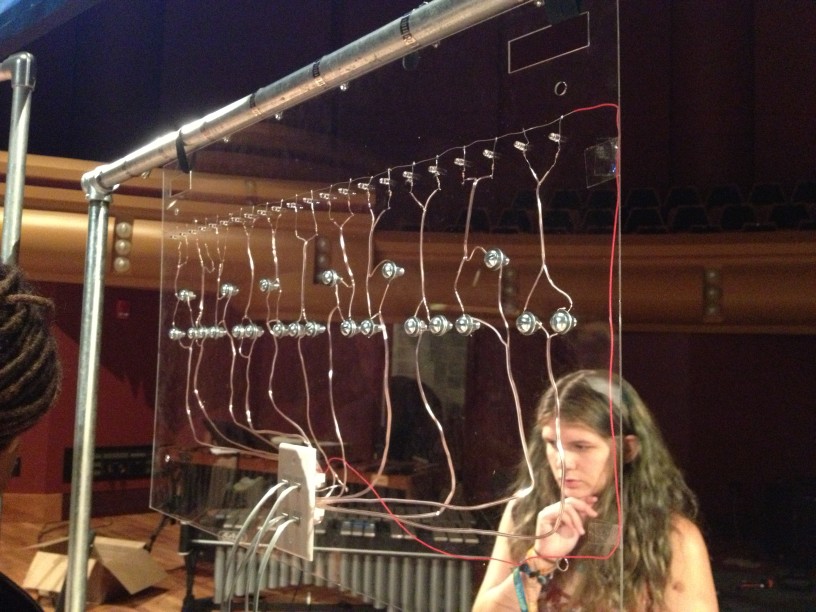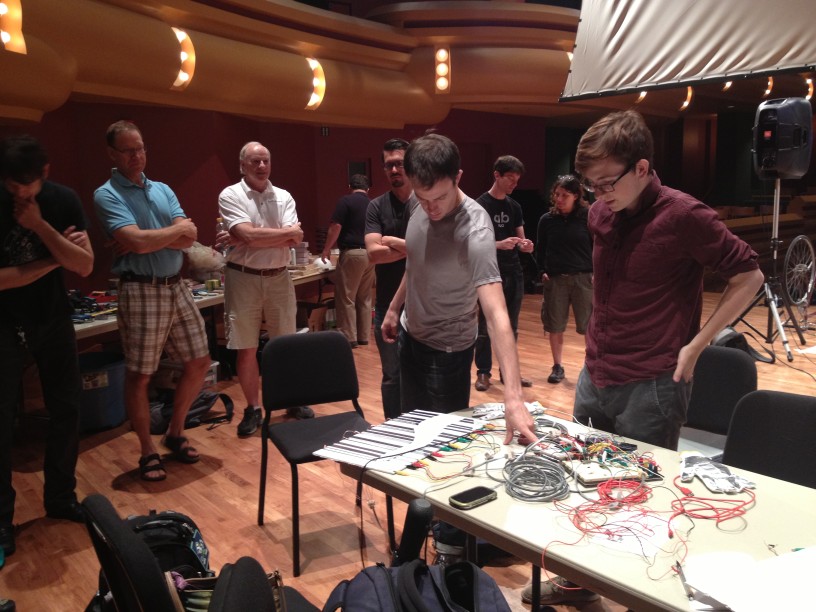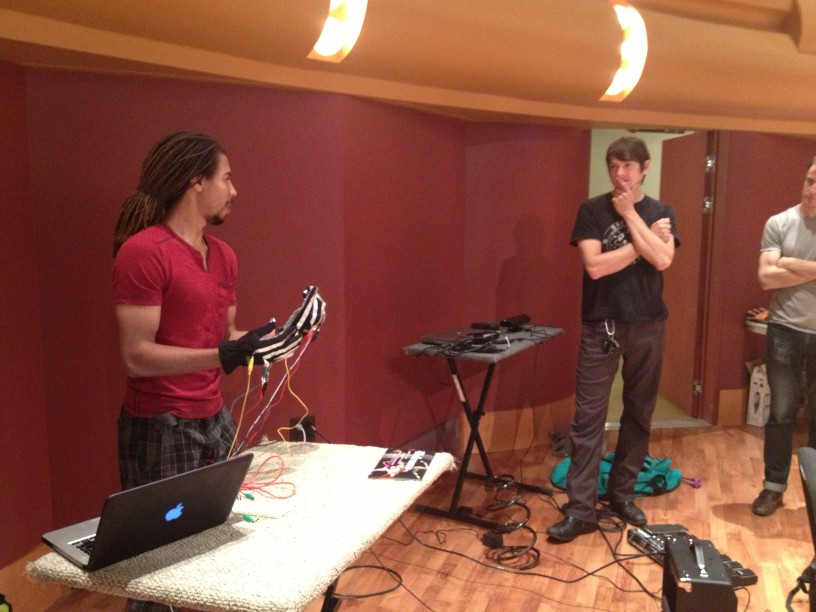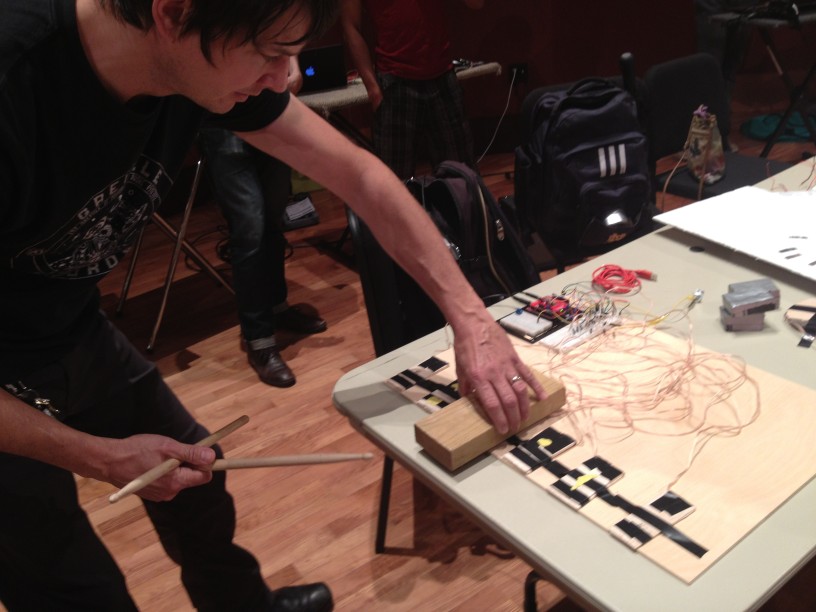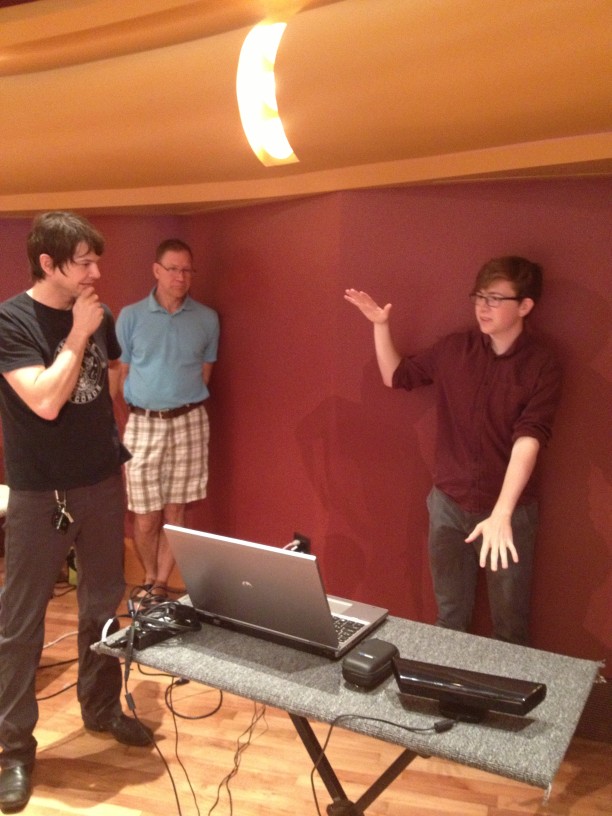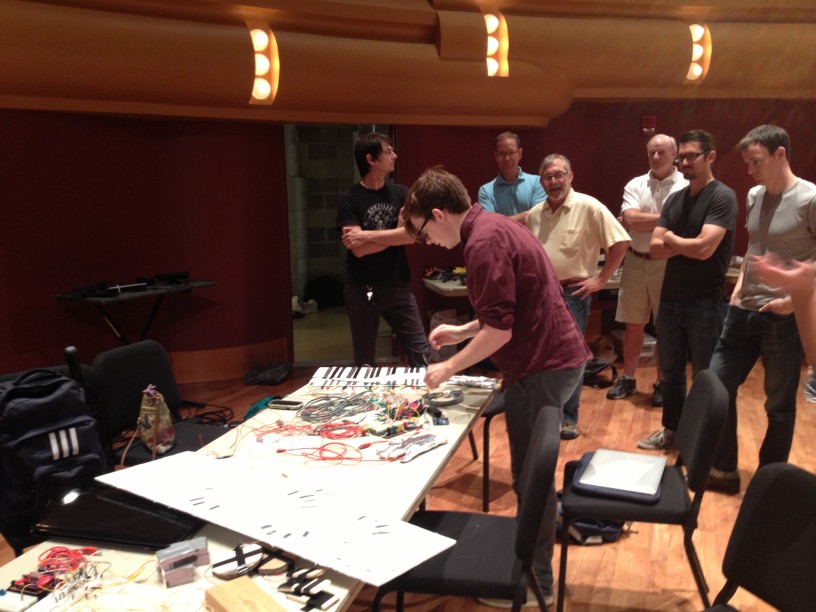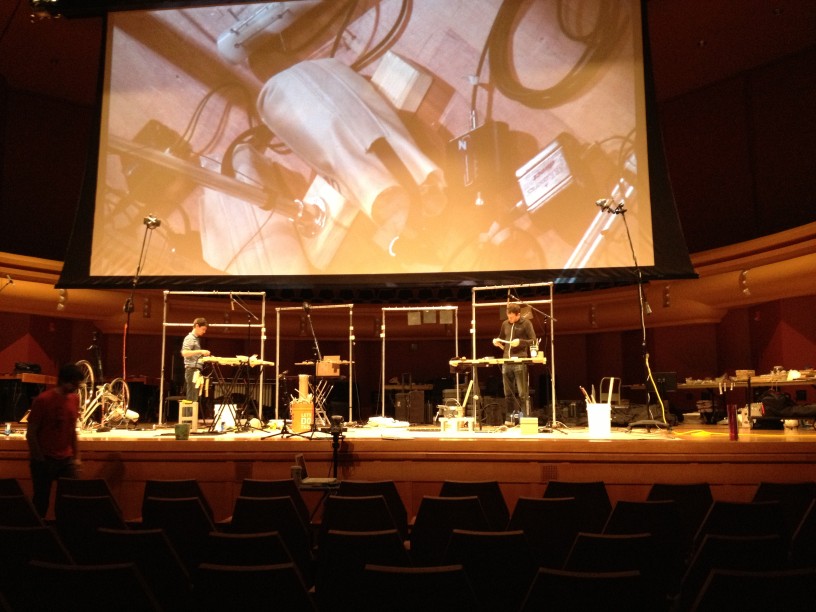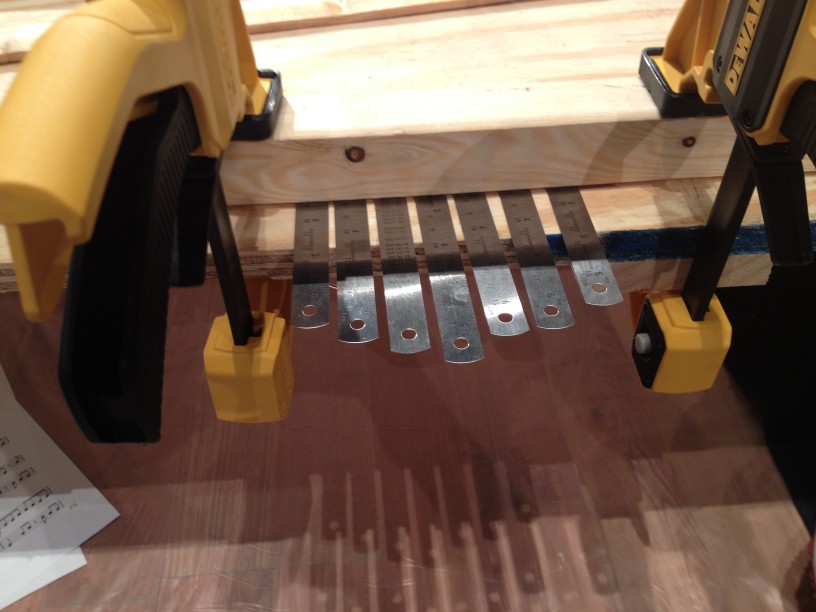The Liquid Music Series’ Sam Tygiel recently had a chance to speak with composer, percussionist and Wilco drummer Glenn Kotche. They discussed Kotche’s diverse musical background, his approach as a composer and Wild Sound, the work he is bringing to Saint Paul for the Liquid Music Series. Tickets + Info
What initially attracted you to art music and composing?
Since I was a child I’ve always straddled the worlds of rock music and classical music through the different ensembles that I’ve been in. I’ve always been in rock bands and I’ve always been in school bands and orchestras. I went to music school for college and at one point thought that I was going to go the symphonic route. In my time in college I tried out a lot of different areas of percussion and played in a lot of different ensembles and ended up going more in the drum set route. After college my whole approach to drumming was a hybrid of all those things I learned from playing in opera, from playing in steel drum band, in African ensemble and percussion ensemble. That’s when I joined Wilco and started my duo, On Fillmore. I started to really find my own voice and get busy.
After I was with Wilco for a bit I made two experimental percussion records, one more improvised and one comprised of studio collages. Then I became interested in making a more composed percussion record. I went full steam from there and as soon as I released that record I began to get commissions from groups such as Kronos Quartet, Bang on a Can, Silk Road Ensemble and Eighth Blackbird. I started having these opportunities to write and do other things. For me it was really the perfect balance because in a rock band or in my other outlets where I’m playing drum set, it’s more of a group effort. Often times, especially with Wilco, lyrics are at the forefront, that’s the main focus of the music. I love that outlet, I love being part of a team and helping to illustrate the words and make the music feel just right for the lyrics. At the same time I have a lot of other interests in music, from free improvised music to classical, from renaissance to cutting edge 20th century music. I’m interested in exploring a lot of different musical ideas and interests on drums.
I’m much more wired towards rhythm than harmony and melody, even though those are both important aspects of my music. All of the seeds for the musical ideas that I get are based in rhythm. That’s what I tried to do with Mobile originally, explore things that I couldn’t explore on the drum kit with myself, my four limbs, one body, so I started writing for multiple voices. I basically have a lot of rhythm questions I want to ask myself, areas I want to grow in and I set about doing that by composing.
Who are some of the composers in any genre that you pull from as favorites or inspirations? How do you see yourself interacting with the traditions of some of your favorite artists?
I have played a lot of different music from throughout history. I have played a lot of Bach pieces and I’d be lying if I said that wasn’t inside me somewhere. I learned a lot of different extended techniques in modern percussion ensemble, largely from the writing of John Cage and that’s definitely a part of my fabric as well. More recently, when I started writing a lot, Steve Reich became a big inspiration because he comes from a very similar background of percussion driven music as well as Balinese and African music. Those are two common interests we share and he’s incorporated those elements into his music so well which makes him a big influence.
John Luther Adams is another major influence because of the way he approaches writing and what an original voice he has. He goes after these extremely ambitious ideas and he’s always able to pull it off somehow. More than maybe any composer I can think of, John Luther Adams doesn’t repeat himself and he’s constantly exploring new territory as an artist.
Another composer who comes chiefly to mind is Jim O’Rourke, who is a friend that I’ve played with on some of his pop records and the reason I got into Wilco in the first place. We had a side band, Loose Fur, with Jeff Tweedy from Wilco. What a lot of people don’t realize is that he has a composition degree from De Paul and he is an incredible composer. He’s written for oscillators and string quartets as well as drone pieces, radical kinds of sound collages that are so forward thinking, brave music.
He’s always spread himself into all of these different areas of music as a composer, a performer and an engineer and the fact that that he just does all of these things so well has always served as a great example for me. He’s showed me that I don’t have to just be a drummer in a rock band, I can also compose, I can also do sound installations. He taught me that all possibilities are open if you work hard, do it well, do your homework and have a passion about it.
One of the things I heard you saying a lot in there is that it’s good to hear composers who are constantly reinventing and pushing their boundaries. I’d love to hear a little bit about how you approach doing that for yourself as a composer and maybe particularly with this new piece, Wild Sound, that you are working on now.
The reason why I compose is to try and grow, try and learn and explore some ideas that I wouldn’t have otherwise. Composing is a great outlet to do such exploration and I am trying to push into new territory for myself. Lately a lot of the pieces that I’m writing are written on drum set. The formal structure, the architecture of the piece, as well as the ideas and the personality of the music come through on the kit. Then I’ll expand the music out to the instrumentation at hand. Wild Sound is new territory for me; I approached it more as a storyboard, writing almost program music to a degree. I had the idea from listening to a lot of Cage and John Luther Adams, the concept of “wild sounds,” that everything is a sound. Through the history of percussion you can see that anything that is not a string, woodwind or a brass instrument is relegated to the percussion section. The cannon shots from the 1812 Overture or wind machines, starter pistols, tin cans, they all create these different undefinable sounds that percussionists play.
I see everything that is not a woodwind, string or brass instrument as a percussion sound, including recordings, like the field recordings I make. When I’m on tour I tend to go on a lot of walks. There’s a lot of down time and that’s when I do a lot of my composing and think about this sort of thing. I record these walks and I’m always amazed because there’s inevitably going to be a confluence of events that is just mind blowing, that you couldn’t think of if you were composing and that’s something that I’ve always been inspired by. So many different sounds that I hear on these walks arepercussive and so I got the idea of building all of our instruments on stage because the construction sound itself is so percussive and once the instruments are constructed, they will be percussion instruments. So that was my basic premise for the piece.
I wrote a piece for the cellist Jeff Ziegler recently that was inspired by the mutual experiences that we have touring, so I had that kind of storyboard thing going. And then I did that Delta Faucet commercial which was all written on a story board, so maybe this kind of stuff was already in me, mulling around subconsciously. When it came time to write Wild Sound, I thought, “Yeah, I want to write it as a sequence of events more than notes on a page.” I laid out a whole big story line with the four members, laying out the way that the performers would navigate through four different sound environments, moving from wild to rural to industrial to modern and urban and trying to capture those sounds. The piece is also based on an “audio score,” i.e. an audio track that I have composed and made, an audio collage that instructs the performers. Now within that “score” there are several anchors, or sign posts of composed music.
For me it’s a new way of working, it’s not a traditional piece; it’s almost like making an album, which obviously resonates with me as a rock musician. I do think of the piece as a combination of all my different interests. You have the field recordings, capturing these “wild” sounds. In addition, I’ve always experimented with making and customizing my own instruments and implements with Wilco and On Fillmore so there’s that side of me coming out with the building of the instruments. Then you have the actual composed music, the main component of which was written on drum set and later farmed out for four keyboard instruments that they are actually playing on Arduino triggers. It’s kind of like a snapshot of all my different interests as a musician and a composer. It seemed like the best way to work by this more storyboard narrative, for lack of a better term for it.
Talk about why you’re excited to be working with Third Coast Percussion.
Third Coast Percussion approached me years ago while I was in Spain on tour. I was going for a walk and I had this incredible experience walking and I heard all these different sounds and I got the idea for the piece. Since then I got busy doing a lot of other commissions, and they were working on a bunch of records. We also had to find the right presenters and the funding and it finally all came together. It has been a long process even though really, all the work has been done in the last six months or so.
I’ve been blown away by these guys, organization wise, how they divide their tasks. Of course they’re amazing percussionists – that goes without saying – they’re all virtuosic players. I can write what I want to write for them and I don’t have to worry if they can pull it off. It makes my job easy. I also admire how they operate as an ensemble. I’ve worked with a lot of different groups and these guys have their act together like you wouldn’t believe. For this piece we have pages and pages of Google documents with videos and charts and timing. This piece heavily involves engineering and other aspects to pull it off. That’s why we’re working with a team of six engineering interns at Notre Dame this summer to help realize the piece. There’s a lot of cut and dry scientific information like “it takes this long to cut through a pipe, if you cut these u-channel pieces at this length, we’ll get these pitches.” There are all sorts of charts and graphs and Third Coast has organized that information such that the resources have been in place, which has made the process really easy on me. This is new territory for me composing as well and I am trusting them to make a lot of the decisions because a lot of timing in the piece depends on how they perform these actions. It’s a very fluid piece and I’m trusting them on a lot of certain micro decisions.
This is also the first time I’ve worked with a director or video designer, a sound technician, a lighting designer. There’s a whole team of creative people working on this team, which I’ve never done before. A piece of this scale is really interesting for me because I’m using my mentality of being in a rock band. This is also a give and take situation—it’s a collaboration more than me being a composer and saying, “this is how I want it, this is my vision, make it so,” which is the way a composer operates or has to operate a lot of the time. Thank God it looks like it’s the right team in place, helping to shape this piece and make it better than I would have on my own.
It’s challenging enough writing for any instrument, much less an instrument that’s completely new and much less an instrument that is actually being made as you perform on it. How have you approached conceptualizing the piece in light of these challenges and how did working with Third Coast Percussion and the engineers impact that?
Percussionists always get these bizarre sounds and requests. We’ve all played on planks of wood and planks of metal and pipes and we kind of started from there, asking “what are sounds that I know can be constructed on stage and be useful?” When I made of list of these sounds, that’s when the narrative of the piece became obvious to me. I divided the sounds into different categories because some of them sound a lot more animalistic, raw and guttural and some are more refined and pitched almost like a different type of vibraphone or xylophone. We’re using contact mics on a lot of the surfaces, which is something that I’ve always done with percussion, so that I can make these really interesting small sounds, microscopic sounds by using different implements such as springs, sticks, little pieces of sandpaper and different kitchen utensils. When these small sounds are amplified, they compete with the big sounds which makes those small sounds usable and practical.
Notre Dame is really interested in cross disciplinary projects, and with the residency they asked if I would be interested in working with the engineering department in some capacity. My wife has her masters in mechanical engineering and her Ph.D. in bio-engineering and she’s an engineering professor so I was like, “sure, why not, I’ve worked well with engineers, I’ll try it.” My wife gave the idea of incorporating Arduino technology, something I had no experience with. It’s basically these little circuit boards that you can get at Radio Shack and can do different things depending on how you trick them out. They’re user friendly, you can combine them, you can use them as musical triggers, or, as my wife does, you can use them for engineering purposes. The head of the engineering department at Notre Dame, who is our liaison, is very familiar with Arduino technology and he was fully on board with incorporating it in Wild Sound and he helped us develop ways use the technology in the piece. With the help of Arduino triggers and the engineering interns at Notre Dame, we developed ways to play some of the parts that I wrote by using motion sensors or light sensors. We have flex triggers and depending on how much you bend your hand, you are playing just by moving your hand. We have triggers on plexiglass. I can make any sound that I want from working with this technology. The performers might just be waving their hand in the air but you’re hearing a marimba. With that technology we opened up all these instruments that Third Coast and I have zero experience in. The narrative of the piece is going from this raw beginning to this more refined, staged piece in the end. So it opens with cutting, sawing sounds, and raw percussive sound that anyone can make and moves to this super complex technology, with Third Coast performing this very intricate percussion ensemble piece. By the end of the piece, you come full circle as you now have something that sounds more electronic, industrial and modern, even though it’s still constructed, onstage percussion. It’s really hard to articulate what the piece is and it’s still developing, but hopefully that gives you an idea…
What does it mean to you to have your music presented by a classical music organization like The Saint Paul Chamber Orchestra
I love it. The thing I like the best is that there are classical organizations out there that are open minded. They’re not just presenting the same classics over and over, which some people might argue is what has driven younger audiences away from classical music in the first place. The programing that’s happening, especially at the SPCO is so inviting to my generation and even the generation after me. You’re bringing a lot of forward thinking, younger composers who are doing a lot of different types of work and expanding what the definition of classical music and art music is. It is music that’s appealing to our generation, who grew up listening to rock. I’m excited that you guys are brave enough to put on new and challenging music, and pieces like Wild Sound, that are definitely in the cracks and difficult to categorize. Of course, I’d be lying if I said that I didn’t feel I could get some kind legitimacy as a composer. Coming from the rock world, maybe you always have a little bit of a chip on your shoulder, wondering if people just think I’m doing this because I’m in a popular rock band. It’s nice to show that I actually have the goods, Third Coast has the goods, and that we deserve to be there and believed in.
What do you think makes this piece really special? Why are performances like this important for music now and moving forward?
I think Wild Sound is special because it is a new kind of piece. It’s nothing like what I’ve ever done or what Third Coast has done, and collectively nothing that we can think of that has been done before. It’s new territory for all of us, which is exciting. The piece by its nature will be different every time it is performed. There’s musical moments that will always be the same but there is no way you can predict all of these elements to any degree of certainty, especially when you are constructing instruments and when there are a lot of things that can go wrong, which we are completely inviting. Each performance is going to be a new experience. In addition, it is going to be more of an experience for the audience than your typical concert, with audience interaction built into the piece, as well as extremely visually stimulating elements because you’re seeing the construction of these instruments as well as an accompanying video component. Wild Sound is a multimedia experience that’s interactive with the audience and is by the nature of the piece, fluid from night to night.
















